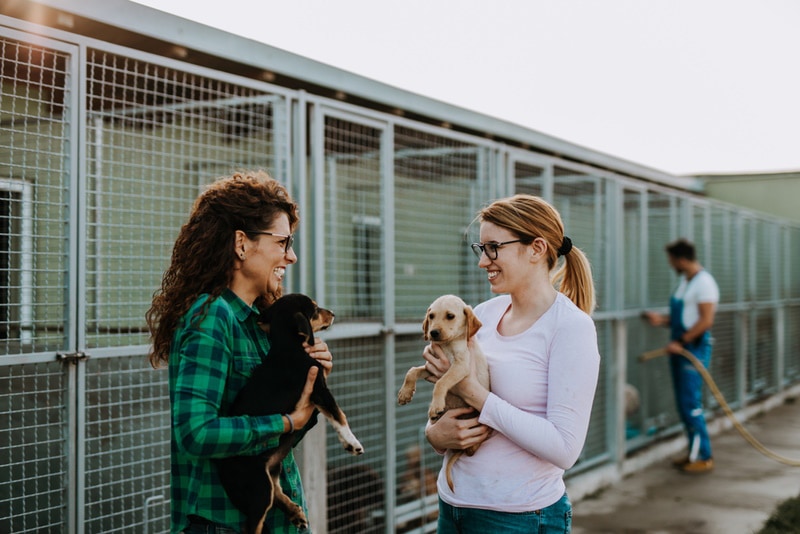
Long-term Care of Adopted Dogs: Ensuring a Healthy Future
Share
Adopting a dog is an enriching experience that brings joy, companionship, and a sense of fulfillment. However, the commitment to long-term care of adopted dogs requires dedication, knowledge, and a genuine concern for their health and well-being. When you bring a dog into your home, you're not just providing them with a place to live; you're offering them a new lease on life. As health-conscious pet owners, it's essential to ensure that your adopted dog receives the best care possible. This article delves into the various aspects of maintaining the health and happiness of your furry companion.

Understanding the Needs of Adopted Dogs
Before diving into the specifics of long-term care, it's crucial to understand the unique needs of adopted dogs. Many of these dogs come from shelters or rescue organizations and may have experienced neglect, trauma, or a lack of proper care in the past. [Learn more about how adoption works](https://www.animalhumanesociety.org/resource/how-adoption-works) to understand the background of these pets better.
Providing a Safe and Comfortable Environment
The first step in ensuring the well-being of your adopted dog is creating a safe and comfortable environment. This involves dog-proofing your home, setting up designated areas for sleeping and eating, and ensuring they feel secure in their new surroundings. For more tips on making your adopted dog feel safe, refer to Tips to make adopted dog feel safe.
Nutrition and Diet: Key to Long-term Health
Nutrition plays a vital role in the long-term care of adopted dogs. A balanced diet tailored to your dog's age, size, and health condition is essential for maintaining their overall well-being. Health-conscious pet owners should focus on high-quality dog food that meets all the nutritional requirements. Regular consultations with a veterinarian can help you make informed decisions about your pet's diet.
Special Dietary Needs
Some adopted dogs may have specific dietary needs due to allergies, medical conditions, or previous malnutrition. It's essential to monitor their health closely and adjust their diet accordingly. For more insights, you can explore articles like How to Adopt a Dog that discuss dietary considerations.
Regular Exercise and Mental Stimulation
Physical activity and mental stimulation are crucial components of long-term care. Regular exercise helps maintain a healthy weight, strengthens muscles, and promotes cardiovascular health. Moreover, engaging activities like training sessions, puzzle toys, and interactive games stimulate your dog's mind and prevent boredom-related behaviors.
Creating a Routine
Establishing a consistent routine can significantly benefit your adopted dog's mental well-being. Dogs thrive on predictability, and a structured schedule for feeding, walking, and playtime can help them feel secure and reduce anxiety.
Veterinary Care and Regular Check-ups
Regular veterinary visits are a cornerstone of long-term care of adopted dogs. Routine check-ups allow for early detection of potential health issues and ensure that your dog stays up-to-date on vaccinations, flea and tick prevention, and dental care. A trusted veterinarian can also provide guidance on any age-related health concerns your dog may face as they mature.
Preventive Measures
Proactive measures such as spaying or neutering, microchipping, and maintaining a healthy weight contribute to the overall well-being of your adopted dog. These steps not only enhance their quality of life but also prevent future health problems. Low-maintenance dog breeds to adopt can be a good consideration for those looking for less demanding care requirements.
Socialization and Behavioral Training
Socialization and training are integral to the successful integration of your adopted dog into your family. Positive reinforcement techniques can help address any behavioral issues that may arise and foster a strong bond between you and your pet. Consider enrolling your dog in obedience classes or seeking the assistance of a professional trainer if needed.
Building Trust and Bonding
Adopted dogs may have trust issues due to their past experiences. Patience, understanding, and consistent positive interactions are key to building trust and a lasting bond with your pet. [Supporting dog adoption programs](https://petzooli.com/blogs/all-our-posts/how-to-support-dog-adoption-programs) can provide further insights into the needs of adopted dogs.
Conclusion: A Lifelong Commitment
Caring for an adopted dog is a lifelong commitment that requires dedication, patience, and love. By prioritizing the long-term care of adopted dogs, you ensure that your furry friend leads a healthy, happy, and fulfilling life. The journey of adoption is a rewarding one, where both the dog and the owner grow and thrive together.

FAQ Section
How often should I take my adopted dog to the vet?
It's recommended to take your adopted dog to the vet for regular check-ups at least once a year. Puppies and senior dogs may require more frequent visits.
What should I feed my adopted dog?
Provide a balanced diet tailored to your dog's age, size, and health needs. Consult your veterinarian for specific dietary recommendations.
How can I help my adopted dog adjust to a new home?
Create a safe and comfortable environment, establish a routine, and use positive reinforcement to help your dog adjust to their new surroundings.
This article contains affiliate links. We may earn a commission at no extra cost to you.
